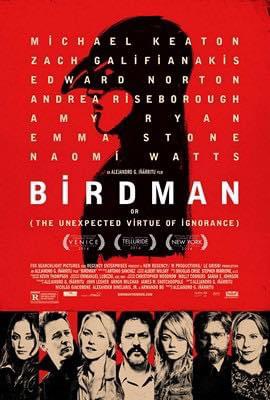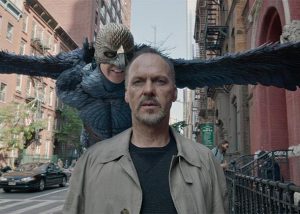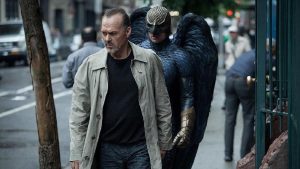Birdman (2014)

Birdman or (The Unexpected Virtue of Ignorance) (2014), directed by Alejandro González Iñárritu, is an audacious, genre-bending film that explores the tension between artistic integrity and celebrity culture. It tells the story of Riggan Thomson (Michael Keaton), a washed-up actor best known for playing an iconic superhero called Birdman in a blockbuster franchise decades ago. Now, in a desperate attempt to reinvent himself and be taken seriously as an artist, Riggan mounts a Broadway adaptation of Raymond Carver’s What We Talk About When We Talk About Love. The film charts the final days before the play’s opening, capturing Riggan’s increasing mental disintegration and his struggle to escape the shadow of his former fame.
Suggested videos for you:
Themes and Narrative
At its core, Birdman is a meditation on the fragility of the human ego and the conflict between personal authenticity and public perception. Riggan is tormented by his irrelevance in the entertainment world, haunted by his alter ego, the Birdman character. This internal conflict manifests in hallucinatory episodes where Riggan seemingly possesses superhuman powers. These flights of fantasy are contrasted sharply with his real-life anxieties: his strained relationships with his daughter Sam (Emma Stone), who works as his assistant, and his fellow actors in the play, including Mike Shiner (Edward Norton), a talented but egotistical method actor.
The film explores broader questions about the nature of fame and the artificiality of celebrity. Riggan’s desperate attempts to escape being typecast as a superhero are mirrored by the meta casting of Michael Keaton, who himself played Batman in the 1980s and ‘90s. This interplay between Keaton’s real-life persona and his role adds layers to the film’s commentary on how public figures are consumed and discarded by the entertainment industry. The film’s subtitle, “The Unexpected Virtue of Ignorance,” also reflects on how Riggan’s lack of awareness of the modern world, including his disdain for social media and the changing nature of fame, is paradoxically what makes him compelling to the audience.
Cinematography and Direction
Perhaps the most visually distinctive element of Birdman is its continuous-shot style. Cinematographer Emmanuel Lubezki, who won an Oscar for his work, created the illusion that the entire movie is one long, uninterrupted take. While this technique has been used in other films (notably Alfred Hitchcock’s Rope), in Birdman it serves a specific purpose: to immerse the audience in Riggan’s increasingly unstable perspective. The camera snakes through the confined backstage spaces of the theater, following characters in long takes that heighten the sense of tension and claustrophobia.
This seamless camerawork, combined with the film’s tight setting, creates an almost dreamlike atmosphere, where the lines between reality and Riggan’s delusions blur. The drum-heavy jazz score by Antonio Sánchez further complements this disorienting effect, adding an improvisational, chaotic rhythm that mirrors Riggan’s mental unraveling. The soundtrack, which is largely diegetic, punctuates the film’s surreal tone, becoming part of the fabric of Riggan’s world rather than a separate accompaniment.
Performances
Michael Keaton delivers a career-defining performance as Riggan Thomson. Keaton’s portrayal is raw and vulnerable, capturing the complexity of a man trying to reconcile his past fame with his present mediocrity. The meta nature of Keaton’s casting gives the performance an added layer of poignancy, as viewers can’t help but draw parallels between Riggan’s attempts to move beyond his superhero role and Keaton’s own history as Batman.
Edward Norton also shines as Mike Shiner, an unpredictable and egotistical actor whose presence throws the production into chaos. Norton’s character is both a foil to Riggan and a representation of the extreme narcissism often found in artistic circles. Emma Stone, as Riggan’s disillusioned daughter Sam, provides a grounded counterpoint to the male characters, representing the next generation’s cynicism toward celebrity culture. Naomi Watts, as the nervous actress Lesley, and Zach Galifianakis, as Riggan’s best friend and lawyer, round out a stellar supporting cast, each adding depth to their characters while contributing to the film’s frenetic energy.
Meta-Narrative and Satire
Birdman operates on multiple levels, as both a personal narrative about Riggan’s struggle for relevance and a broader satire of the entertainment industry. The film skewers Hollywood’s obsession with superhero franchises, with Riggan often lamenting the fact that he’s only remembered for playing Birdman. In one scene, he rails against the dominance of CGI-laden blockbusters, calling out actors like Robert Downey Jr. and George Clooney by name, positioning himself as a symbol of “real” art in an industry that prioritizes profit over substance.
The film also critiques the theater world, particularly through the character of Mike Shiner. Shiner’s dedication to method acting and his pretensions about truth and art are exposed as little more than self-serving egoism. The juxtaposition of film and theater becomes a central tension, with Riggan caught between the commercial world of movies and the supposedly more artistic realm of Broadway. This tension is embodied in the film’s visual language, where the fantastical elements of Riggan’s delusions (like his telekinetic powers) clash with the gritty, real-world setting of the theater.
Surrealism and Ambiguity
One of the film’s most compelling aspects is its use of surrealism and ambiguity. Riggan’s hallucinations are never fully explained, leaving the audience to question how much of what they’re seeing is real. In many ways, Birdman is a modern-day fable about identity, where the boundaries between the real and the imagined blur as Riggan’s psyche fractures. The film’s ambiguous ending—where Riggan seemingly achieves flight after a climactic confrontation with his Birdman persona—has been interpreted in multiple ways, from a metaphorical liberation to a delusional break with reality.
Conclusion
Birdman is a daring and innovative film that defies easy categorization. With its seamless blending of genres—dark comedy, drama, and magical realism—it offers a biting commentary on fame, art, and the human condition. Alejandro González Iñárritu’s direction, combined with Emmanuel Lubezki’s breathtaking cinematography, results in a visually stunning, immersive experience that challenges conventional narrative structure. The performances, particularly from Michael Keaton and Edward Norton, anchor the film’s more abstract elements, offering a deeply human portrait of characters struggling with their own insecurities and desires for validation.
In its exploration of artistic authenticity and the quest for relevance, Birdman stands as a bold reflection on the nature of identity in an age dominated by celebrity and spectacle. It’s a film that invites repeated viewings, each time revealing new layers of meaning, and it remains one of the defining films of the 2010s.











